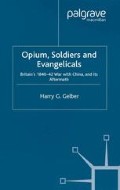Abstract
It says a good deal about London’s ‘softly, softly’ approach to Chinese issues that there was no reaction at all to Napier’s death. Palmerston himself had spoken of Napier’s ‘foolish pranks’. All the British Cabinet did was to appoint his former assistant, John Francis Davis, to succeed him. Davis had accompanied the Amherst embassy to Beijing in 1816, and then spent twenty years in China for the East India Company. He now promoted a policy of being ‘perfectly quiet,’ with no attempt to negotiate with the Chinese or even to expand trade. That tallied well enough with Chinese views since, as soon as Napier was dead, the Governor-General ordered the English traders, as usual through the Hong merchants, to send home for a new head man, but ‘a commercial man, conversant with business. It is unnecessary again to appoint a barbarian headman, thereby causing friction and trouble.’1 Here was traditional policy, reinforced by China’s experiences on the trading frontiers of Central Asia: taming barbarians like Kazakhs or Mongols by rule through local governors and laws.
Access this chapter
Tax calculation will be finalised at checkout
Purchases are for personal use only
Preview
Unable to display preview. Download preview PDF.
Notes
Robinson, note of 29 Jan. 1836 to Palmerston, quoted in W.C. Costin, Great Britain and China 1833–1860 (Oxford: Oxford University Press, 1937), p.31.
Gerald S. Graham, The China Station: War and Diplomacy 1830–1860 (Oxford: Oxford University Press, 1978), p.62.
For example, letter of 28 April 1835, quoted in Susanna Hoe and Derek Roebuck, The Taking of Hong Kong; Charles and Clara Elliot in China Waters (Richmond, Surrey: Curzon Press, 1999) p.44.
James M. Polachek, The Inner Opium War (Cambridge, MA: Harvard University Press, for the Council on East Asian Studies, Harvard University, 1992), p.106.
Jonathan Spence, ‘Opium Smoking in Ch’ing China’, in Frederic Wakeman Jr and Carolyn Grant (eds) Conflict and Control in Late Imperial China (Berkeley: University of California Press, 1975), pp.150–1.
Wakeman, Frederick Jr, ‘The Canton Trade and the Opium War’ in Denis Twitchett and John K. Fairbank (eds), The Cambridge History of China, vol.10, The Late Ch’ing 1800–1911 Pt I, ed. John K. Fairbank (Cambridge: Cambridge University Press, 1978), Ch.4, pp.33–4.
H. Hamilton Lindsay, letter (of 1 March 1836) to the Rt. Hon. Viscount Palmerston on British Relations with China, published as a pamphlet by Saunders and Otley (London, 1836).
Sir James Matheson, The Present Position and Future Prospects of the British Trade with China (London: Smith Elder and Co., 1836). Hoe and Roebuck suggest that it was ghost-written for him: see The Taking of Hong Kong, p.54.
Justin McCarthy, A History of Our OwnTimes, vol.1 (London: Chatto and Windus, 1881), pp.175–6.
J. Phipps, A PracticalTreatise on China and theEasternTrade (London: W.H. Allen, 1836), Introduction. A modern authority estimates that during the decade before 1842 opium made up about two-thirds of all British plus Indian imports into China. Greenberg, British Trade … p.50.
Kuo Pin-chia, A Critical Study of the First Anglo-Chinese War, with documents (Shanghai: Commercial Press, 1935), p.213.
Peter Ward Fay, The Opium War 1840–1842 (Chapel Hill, NC: University of North Carolina Press, 1975), p.138.
Author information
Authors and Affiliations
Copyright information
© 2004 Harry G. Gelber
About this chapter
Cite this chapter
Gelber, H.G. (2004). It’s More Than Trade, Stupid! Canton 1835–38. In: Opium, Soldiers and Evangelicals. Palgrave Macmillan, London. https://doi.org/10.1057/9780230000704_3
Download citation
DOI: https://doi.org/10.1057/9780230000704_3
Publisher Name: Palgrave Macmillan, London
Print ISBN: 978-1-349-51037-5
Online ISBN: 978-0-230-00070-4
eBook Packages: Palgrave History CollectionHistory (R0)

